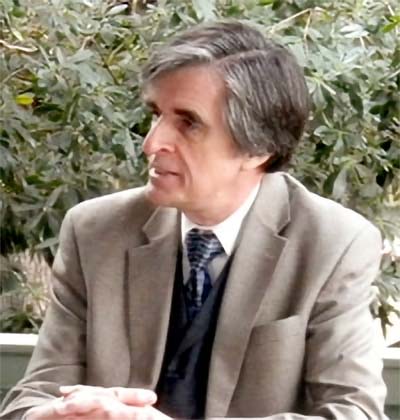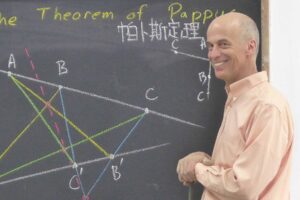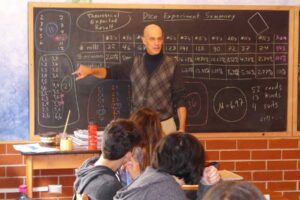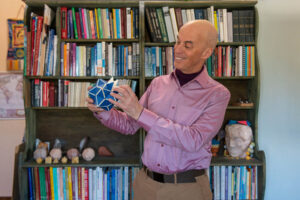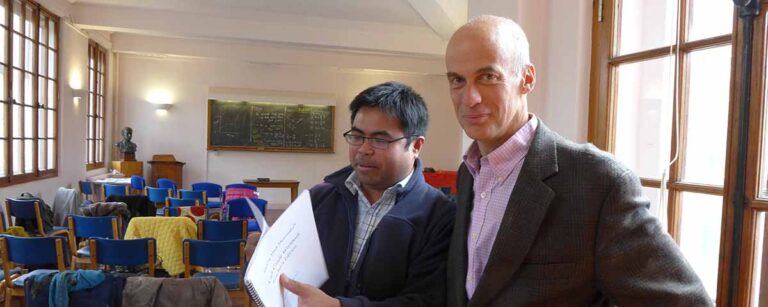As part of our series looking into the use of technology in education, we’re republishing this article in which Douglas Gerwin explores the use and effect of technology on the development of the”I” or sense of self in children, as well as Rudolf Steiner’s comments on the need to strengthen in ourselves the human capacities being supplanted or mimicked by the technology. – Ed.
By DOUGLAS GERWIN, Ph.D.
[This article is adapted from an earlier version that appeared in Center & Periphery, a thrice-yearly online newsletter of the Center for Anthroposophy available at centerforanthroposophy.org.]
During the course of history, advances in technology have typically been accompanied by stern warnings about their false promises and dangers to our physical or mental health. Listen only to the words of Thamus, legendary king of Thebes, who according to Socrates had this to say to the divine Theuth when the Egyptian god presented the king with a new technology for recording events and memories called “writing”.
“If men learn this it will impart forgetfulness in their souls; they will cease to exercise memory because they rely on that which is written, external marks. What you have discovered is a recipe not for memory, but for reminder. And it is no true wisdom that you offer your disciples, but only its semblance, for by telling them of many things without teaching them you will make them seem to know much, while for the most part they know nothing, and as men filled, not with wisdom, but with the conceit of wisdom, they will be a burden to their fellows. ” 1
Similar outcries during the Renaissance were launched against the printing press. In more recent times we have heard laments about the corrosive effects on our language of the tape recorder, the typewriter, the word processor, spell check, and now e-mail and Twitter and AAA –– the Age of Acronyms and Abbreviations. A modern-day Cassandra might well tweet, “OMG. How un42n8!”
Thamus’ words of caution did not prevent writing from becoming an increasingly widespread tool, first among priests and scholars and by now in the pudgy hands of every eager first grader. No elementary school teacher would wish it otherwise. And yet there is prescience in Thamus’ warning. Our powers of memory today, it would seem, are no match for those of the Ancient Greek bards, who we are told could recite Homer’s epic poems by heart, hours at a time. And high school teachers tell me they can discern by its tone and fluency whether a student’s essay was hand-written or composed on a keyboard.
Do I wish to imply that we should therefore roll back the teaching of writing or extend “Screen-Free Week” to all electronic communication? Certainly not. Rather, my point is to suggest that Socrates’ cautionary tale hints at an aspect of technology we are prone to overlook.
As the root meanings of the word suggest, technology [Gr. techne, “tool” and “way, means”] implies something about instruments or devices, on the one hand, and something about ways to use them, on the other. Before you can make use of a tool, you need first to develop a measure of skill to carry out on your own the physical or mental deed that the tool is intended to make easier.
Don’t give toddlers a hammer, for example, until they have mastered some level of skill at hitting things accurately. Keep calculators away from children until they have acquired some proficiency in arithmetic operations as well as some measure of mathematical reasoning. In the first case, youngsters need to build up physical muscle before a hammer can serve as a useful (rather than as a recklessly destructive) tool; in the second case, children need to build up “spiritual muscle”––say, through mental math––before a calculator can function as a useful aid to intellectual operations rather than as a substitute for them.
Herein lies the key: give a child a tool early on in life, and it will supplant the very skill it was intended to supplement. In other words, tools become prosthetics, or crutches, if introduced too soon. Their use also tends to become addictive.

The same case can be made about any piece of technology, to the degree that it enhances a human skill or way of doing something. Electronic media are no exception. The fundamental questions remain the same:
- Which human skills are these electronic “tools” designed to assist or even mimic?
- At which age will children have developed these skills sufficiently so that these “tools” can serve rather than subvert them?
Let’s take television, perhaps one of the more controversial examples. Television mimics the human ability to create pictures. According to Rudolf Steiner, children learn to think by inwardly creating mental pictures and mental images. If pictures are supplied outwardly and ready made, they rob the child of the opportunity to build the “imaginative muscle” needed to become independent thinkers. Since the ability to think unfolds gradually, the age at which children can benefit from television, rather than become slaves to it, will vary. A general guideline, though, will be: the later, the better, recognizing that we cannot shut off our children from all access to these ubiquitous tools.
Learn how the Jamie York Academy uses limited appropriate technology to create a learning community for homeschoolers.
Indeed, Rudolf Steiner cautions against banning tools of technology outright. In a lecture given shortly after the outbreak of World War I, he declared: “It would be the worst possible mistake to say that we should resist what technology has brought into modern life, that we should protect ourselves . . . by cutting ourselves off from modern life. In a certain sense this would be spiritual cowardice.” [emphasis added]
Instead, Steiner goes on to say, the more we expose ourselves to technology (rather than flee from it), the more we need to strengthen in ourselves––for instance, through the arts––precisely those human capacities that technological devices mimic or threaten to supplant.
In our present time, attention is turning to the appropriate use of computers in schools. Paradoxically, we read about kindergarten teachers who are encouraging the use of computers and tweeting in pre-school while, at the very same time, some university professors are banning these tools outright from their lectures and jamming their seminar classrooms to curb the distractions of so-called social media. In this hotly contested field of enquiry, the questions suggested earlier can be posed once again:
- Which human skills does the computer mimic or supplement?
- At which age will children have developed these skills sufficiently so that the computer can assist rather than hijack them?
To the first question: Which human skills does the computer mimic or supplement? It is tempting to think of the computer as a fancy calculator or stern grammarian, and for many people (myself included) this device does indeed serve these functions. But what makes the computer distinctive from other technological devices is its ability to simulate human experience. In fact, it has been suggested that we rename the computer “the simulator” in recognition of the tremendous benefits that the computer has wrought in our culture, especially in the fields of engineering, medicine, and––yes––entertainment and even broadcasting. Computer models allow us to test new engines, fly new airplanes, stage the landing of spacecraft on distant planets, try out new drugs without even creating them in the physical world. Using virtual models, we are able to experiment with new designs and simulate their effects. By the same token, every weather map you see on the evening newscast, like just about every vehicle or building you see get blown up in a scene of a so-called “action movie” these days, is some kind of computer simulation. If you have remained seated long enough at the end of a film to watch the credits roll up the screen, you will know just how many people work on a film’s computerized “FX”.
So, what’s the problem with that? The problem is the same as for all examples of technology. It’s great when it supplements a skill you have already developed, and it’s not so great when it supplants it. If you have mastered some drawings of projective geometry, the computer can enhance your understanding and appreciation of this mind-bending subject through models of geometric forms set whirling in simulated motion. But in teaching this subject, I would never wish my students to work with these simulations until they had first achieved a measure of skill in making their own drawings. It’s the difference between listening to a recording of music you don’t know and listening to a recording in which a skilled soloist plays precisely the piece you have struggled for months to play yourself. The recording is all the more thrilling if it supplements your own experience, rather than replacing it.
There, then, is the first point: the computer supplies us with a virtual experience that can serve to supplement our actual, that is to say lived, experience. The mischief––including, I would suggest, the beginning of addiction––begins when the computer supplants it.
Virtual experience is of a different order of being from lived experience. It is like an advertisement for a loaf of bread: the promise––but not the delivery––of nourishment. If anything, the image will stir the craving but not, of itself, relieve it.
To the second question: At which age will children have developed these skills sufficiently so that the computer can assist rather than hijack them? If we can recognize the specific genius of the computer as being its ability to simulate human experience, then (at least in an abstract way) we have already answered the second question. The child will be ready to benefit from simulated experience to the degree it has already engaged in its own lived experience. But here’s the rub: who is willing––or even able––to withhold the computer from children for that long? As one set of parents reported, the more they try to keep the computer from their children, the more they run after it. So we need an alternative approach.
Here’s one. Let’s ask a practical question: what are children not doing while engaged with the computer that otherwise they might be doing? Three things come to mind:
- They are not moving
- They are not creating their own mental pictures
- They are not engaged in lived experience
Empirically, we know that children need to exercise all three of these capabilities if they are to enjoy a healthy physical, emotional, and spiritual life, both in childhood and later in adult life. In the context of Waldorf education, we know that all three of these exercises involve the child’s developing sense of self, or “I”. When the child’s “I” is engaged, the child will develop healthily; when the “I” is not engaged, the child will not mature.
Empirical studies show that the “I” is most engaged when the child is stirred to physical movement (especially in the pre-school years), when it is inspired to create mental pictures (especially during the grade school years), and when it is motivated to embrace self-directed lived experience (especially in high school and in the years that follow). To the degree, then, that children spend their time on the computer at the expense of exercising these three capacities, to this same degree their caretakers––that is, we as their parents and teachers––need to provide them with all the more opportunities to develop these capacities.
A ratio of computer time to movement time; a ratio of computer time to mental creativity time; a ratio of virtual computer experience to lived experience needs to be calculated––perhaps negotiated and modified––as the child gets older. The key point, though, is that movement, mental creativity, and lived experience need to be “front loaded”, so to speak.
First the real, then the simulation. Otherwise, the child will run the risk of growing up without the full engagement of its “I” or ego. In this scenario, the child remains the hapless apprentice to the magical powers of technological tools prematurely entrusted to its care. Put simply, when supplanted prematurely by a tool that simulates its activity, the “I” has no chance to fulfill its mission, which (among other things) is to steer the child towards becoming a fully mature adult.
Notes
1 Plato, Phaedrus, 275a-b.
2 The term “media” has an interesting and surprisingly short biography. As recently as the 1970s the Oxford English Dictionary listed only three meanings for this term––the oldest going back no further than the 1840s––and none of them had anything to do with newspapers, magazines, radio, film, or television, though the phrase “mass media” was circulating in popular American parlance as of the 1920s.
Instead, “media” is listed in the OED as a biological term denoting the middle membrane of an artery, while in phonetics it refers to a soft mute sound, such as in the consonants “b”, “g”, or “d”. The third definition is simply as the plural of the noun “medium”. On this view, iron bars or pools of water or even table tappers could be described as being “media” for sounds, waves, or disembodied spirits.
3 Rudolf Steiner, “Technology and Art”, Dornach, 28 December 1914.
A note about the title of this article
“The Sorcerer’s Apprentice” (in German, Der Zauberlehrling) is a ballad by Goethe, written in 1797. The poem begins as an old sorcerer departs from his workshop, leaving his apprentice with chores to perform. Tired of fetching water by pail, the apprentice enchants a broom to do the work for him, using magic incantations in which he is not yet fully trained. The floor is soon awash with water, and the apprentice realizes that he cannot stop the broom because he does not know how to cancel the spell he has cast over it.
Not knowing how to control the enchanted broom, the apprentice splits it in two with an axe, but each of the pieces becomes a new broom and takes up a pail and continues fetching water, now at twice the speed. When all seems lost, the old sorcerer returns, quickly breaks the spell and saves the day. The poem finishes with the old sorcerer’s statement that powerful spirits should only be called out by the master himself.
About the author
Douglas Gerwin, Ph.D., Executive Director of the Center for Anthroposophy as well as of the Research Institute for Waldorf Education, has taught history, literature, German, music, and life science at college and Waldorf high school levels since 1983. He presently divides his time between adult education and mentoring teachers in various North American Waldorf high schools. Douglas is the founder of the Waldorf High School Teacher Education Program at the Center for Anthroposophy and author or editor of nine books related to Waldorf education.
